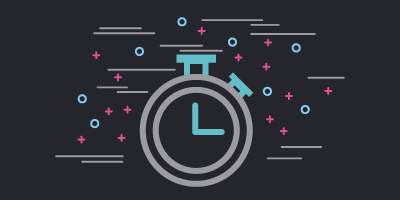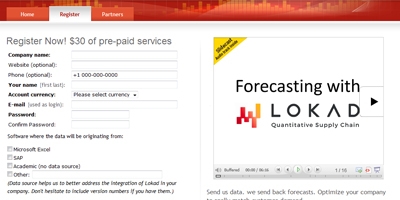Salescast, sales forecasting made WAY EASIER
We are proud to announce that we have just released the first version of Salescast.

Salescast is a web application hosted on Windows Azure that deliverers sales forecasts, the easy way. Feature-wise, Salescast is very close to our Lokad Safety Stock Calculator (LSSC), a desktop app which, despite its name, is also delivering sales forecasts.
Why another client app?
Over the two years of existence of LSSC, we noticed that data integration represented the No1 issue faced by our clients. Forecasting issues were simply dwarfed by the sheer amount of data import issues. We have been trying to add more and more data adapters to LSSC, reaching +20 supported apps, and yet LSSC keeps failing at properly importing data as there are thousands of apps in the market.
Stepping back from the actual situation, we asked ourselves: why should clients even bother about data integration? Shouldn’t this sort of thing be part of the service in the first place? Letting our prospects and clients face such issues was not acceptable.
Thus, we decided to address the problem from a radically different angle: just grant Lokad an access to your data, and Lokad will figure out the rest; and the project codenamed Salescast was born.
Salescast needs one single information to setup the whole forecasting process: a SQL connection to your database. Nearly every modern ERP, CRM, accounting, shopping cart, POS, MRP … software store data in a SQL database. Most of your business apps are probably powered by SQL. Salescast also supports the different SQL flavors: MSSQL, MySQL, Oracle SQL.
Do you believe in magic?
We haven’t discovered the ultimate technology that would make all data integration issues go away. In order to solve data integration issues, Salescast uses a combination of technology and process.
1. Salecast attempts to auto-detect the target application leveraging its library of known apps, and if the data format is recognized, it proceeds with the forecasting process.
2. If the database is not recognized, then a Lokad engineer gets appointed to design the data adapter. Once the adapter is designed we get back to step 1.
How much is this going to cost?
We don’t intend to charge beside our primary per-forecast pricing. More precisely, we promise to give a try at integrating every single app that gets plugged to Salecast. If the integration proves to be really complicated (which happens with old ad-hoc systems) then, we might come back with a quote to complete the job. Naturally, you’re free to refuse the quote.
What about the future of Salescast?
For the initial release of Salescast, we have been exclusively focused on SQL database. Later on, we plan to add a wider range of data formats (Excel spreadsheets, REST APIs, …). We will also enhance the reporting capabilities of Salescast. Just let us know what you need.
Salescast is readily available, get your forecasts now!


